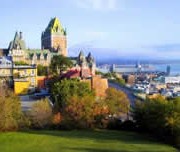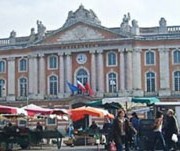Read what Cactus’ Cecile Sargueux has to say about her home town…and if you get stuck see the English version below.
La Ville Rose de France – ce qui fait de Toulouse une formidable destination d’études
Toulouse, capitale de la région Midi-Pyrénées, est une ville des plus pittoresques du sud de la France, où il fait bon vivre en toutes saisons.
C’est une ville universitaire attractive et historique, mais qui est aussi renommée en technologie de pointe – une des principales attractions est la Cité de L’espace, un parc à thème scientifique et éducatif basé sur l’astronomie.
Culture et Gastronomie
Les 440 000 habitants de Toulouse sont pour la plupart fiers de la culture unique de l’Occitanie, appelée aussi le Pays d’Oc (Occitan: lo País d’Òc). Cette culture commune s’étend sur tout le sud de la France, et tire ses origines de la culture espagnole, italienne et française combinées. L’Occitanie révèle toute sa beauté à travers la population, la langue, les édifices, et évidemment la nourriture!
C’est une ville hautement culturelle avec de nombreux musées exposant par exemple son héritage Cathare. De plus, des expositions d’art, des festivals et des concerts ont lieu toute l’année dans la métropole. Par ailleurs, des marchés sont organisés chaque semaine, offrant un large choix de nourriture typique de la région, tels que pain, saucisses, fruits et légumes frais etc.
Quant à la gastronomie, Toulouse regorge de plats typiques. Il faut mentionner le cassoulet, le confit de canard, les saucisses de Toulouse, les champignons, les produits issus de la fleur de Violette (bonbons, confiture…) etc. Le dessert traditionnel est le Fenêtra, un gâteau à base de pâte d’amandes, d’abricot et de citron. La boisson typique est l’Armagnac, la plus ancienne eau de vie du Sud Ouest.
Architecture et sites historiques
La particularité de la ville est que chaque bâtiment est construit à partir de briques rouges/ roses, dont le teint varie avec le soleil! De plus, la Ville Rose, comme elle est communément appelée, détient de nombreux monuments répertoriés par l’UNESCO, tels que le Canal du Midi ou l’église St Sernin. La place principale est la place du Capitole où le symbole de l’Occitanie, une croix à douze pointes, est gravé au sol avec un signe astrologique à chacune des pointes.
Population et mode de vie
Il y a plus de 100 000 étudiants à Toulouse, qui représente ainsi la 3ème plus importante ville universitaire de France. Le soir, la ville reste dynamique et chaleureuse, et les bars et rues sont souvent bondés toute la nuit durant, surtout lorsque le climat est doux. La journée, les Toulousains aiment déambuler dans les rues du centre ville, ou bien le long de la Garonne. Ils apprécient aussi le fait de s’asseoir à la terrasse d’un café, ou dans une des nombreuses places de la ville.
Peut-être est-ce dû au climat tempéré de la région, mais l’art de vivre de Toulouse est résolument différent du reste de la France. L’accent chantant va de pair avec la nature joyeuse des Toulousains, qui sont réputés en France pour être des gens amicaux, francs et souvent à sang chaud.
Ceux qui sont nés à Toulouse la considèrent souvent comme leur « ville de cœur », et par conséquent ne voudraient jamais la quitter. Le célèbre chanteur français Claude Nougaro en est un exemple, lui qui fut né à Toulouse, et qui avait l’habitude de chanter pour sa ville bien-aimée…
ENGLISH VERSION
France’s ‘pink city’ – what makes Toulouse a great study destination
Toulouse, the capital of the French region of “Midi-Pyrénées”, is one of the most colourful cities in the south of France, where the weather is nice all year round.
It’s an attractive, historical university town but is actually also well-know for state-of-the-art technology – one of the city’s main attractions is La Cité de L’espace, a technological and educative theme park based on astronautics.
Culture and gastronomy
Toulouse’s 440 000 inhabitants are proud of the unique culture of the “Occitanie” territory, also called the Oc Country (Occitan: lo País d’Òc). The common culture of Occitanie is found throughout the whole of southern France, and is made up of Spanish, Italian and French influences. L’Occitanie reveals all its beauty through the people, the language, the monuments and obviously, the food!
It is a highly cultural city, with lots of museums exhibiting, for instance, the Cathare heritage of Toulouse. And many art exhibitions, festivals and concerts take place throughout the year in the city. In addition, big markets are organised every week, offering a wide range of typical food of the region, including bread, sausages, fresh fruits or vegetables.
When it comes to gastronomy, Toulouse offers lots of delicious specialities. Included amongst these are Cassoulet, confit of duck, Toulouse sausages, mushrooms, and products made from the violet flower (candies, jam…) etc. The typical dessert is the Fenetra, a marzipan, apricot and lemon cake. The typical beverage is Armagnac, the oldest ‘eau de vie’ of the South west.
Architecture and historical sites
The particularity of the town is that every building is built with pink/red bricks, whose shade varies with the sun! Moreover “La Ville Rose”, as it is commonly known, has plenty of monuments which are classified by UNESCO, such as the Canal du Midi or the St Sernin Church. The main square is La Place du Capitole where the symbol of Occitanie, a twelve point cross, is engraved on the floor with a birth sign at each corner.
People and lifestyle
There are more than 100 000 students in Toulouse, which makes it the 3rd largest university town in France. It is a very lively and warm city by night, where bars and streets are often busy all night long, mainly when the weather is mild. During the day the “Toulousains” like to saunter around the town centre streets, or along the beautiful river – La Garonne. They also love sitting at a table outside a café, or in one of the many squares.
Perhaps due to the balmy climate of the region, the way of life in Toulouse is different from all other cities in France. The melodic accent goes hand to hand with the happy nature of the Toulousains, who are well-known in France to be friendly, frank and warm-blooded people.
Those who are native to Toulouse often consider it a town that belongs to their heart, and as a result they would never want to leave. An example is famous French singer Claude Nougaro, who was born in Toulouse and who used to sing for his beloved city…
Cactus Language offer French language courses in the UK, New York, France and Canada!





